(36 products available)














































































































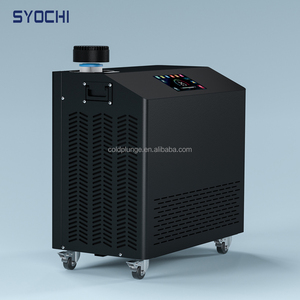


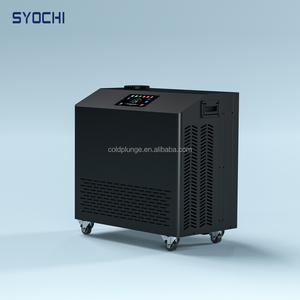














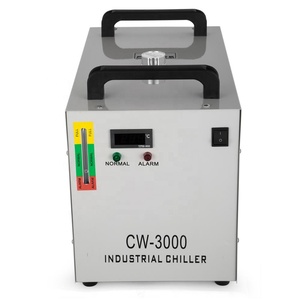



































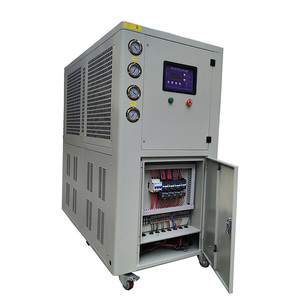


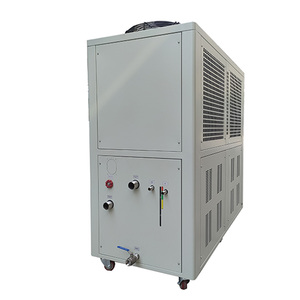

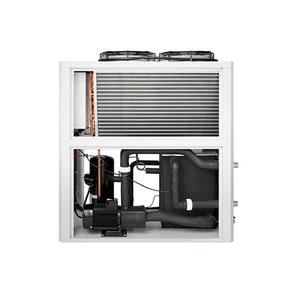






















MRI machines are complex imaging equipment that requires intensive cooling to maintain magnet stability and optimal functioning. The magnet in the MRI machine needs to be maintained at cryogenic temperatures, typically in the range of -269 °C (4 K) or thereabouts, to ensure superconductivity and consistent imaging quality. As a result, MRI machines utilize industrial chillers of various types to assist in cooling and temperature stabilization.
The following types of MRI machine coolers have been recognized as popular and effective for the purpose:
Air-Cooled MRI Chillers:
An air-cooled MRI chiller utilizes ambient air to remove heat from the MRI machine through the process of natural convection or forced convection, involving a fan or multiple fans. These units are often simpler in terms of installation as they do not require any additional cooling equipment. However, the performance may be affected by the ambient temperature and air quality of the surroundings.
Water-Cooled MRI Chillers:
A water-cooled MRI chiller, on the other hand, utilizes water to absorb the heat from the MRI machine. They are often more efficient as compared to their air-cooled counterparts, even though they may require a more complicated setup involving a consistent supply of clean water.
Scroll Compressor Chillers:
As a type of water-cooled MRI cooler, a scroll compressor chiller uses a scroll compressor to cool the MRI machine by compressing and expanding refrigerant gas consecutively in a circular motion. These machines are generally more efficient and quieter than traditional compressors. Therefore, they are popular choices for the cooling needs of sensitive equipment such as an MRI machine.
Air-Cooled Condenser Chillers:
This is another subtype of the air-cooled MRI chiller. An air-cooled condenser chiller directly utilizes the ambient air or forced air through the fan to release the heat from the refrigerant. Although the performance may be impacted by external temperatures and air pressure, they are easier to install, and the maintenance requirements are low.
Here are some key MRI machine chillers with their specifications:
Chiller 1:
Capacity: Capacity 1.5 ton in cooling
Temp.: Temp. from 1 to 7 degree celsius
Compressor: Hermetic compressor
Refrigerant: R-407c or R-134a
Condensor: Water cooled condenser
Control: PLC controller with LCD screen
Power supply: 220V/50Hz/1Ph
Weight: 150 kg
Chiller 2:
Capacity: 5 ton
Temp.: 5 to 10 Degree Celcius
Compressor: Scroll compressor
Refrigerant: R-407c or R-134a
Condensor: Air cooled condenser
Control: PID control with programmable controller
Power supply: 380V/50Hz/3Ph
Weight: 250 kg
Chiller 3:
Capacity: 10 ton
Temp.: 5 to 10 Degree Celcius
Compressor: Semi hermetic compressor
Refrigerant: R-407c or R-134a
Condensor: Water cooled condenser
Control: PLC controller with LCD screen
Power supply: 380V/50Hz/3Ph
Weight: 400 kg
Regular Inspections:
Regular inspections are essential to chillers maintaining MRI performance.
Cleaning:
Keeping the MRI chiller clean helps the machine run better. With a damp cloth, wipe down the outside of the chiller to remove dust and debris.
Check Water System:
Check the cooling water system regularly if the MRI uses a water-cooled chiller. Look at the water pump, pipes, and water tanks to ensure there are no leaks or issues.
Lubricate Components:
Lubricate moving parts, such as the motor and bearings, helps MRI machine chillers work smoothly. Follow the manufacturer's guidelines and add the appropriate lubricant to lubricated parts.
The MRI machine functions dependent on the performance of the MRI cooler and MRI chiller. Hence, MRI chillers can be counted as life savers and are integral in the following fields:
Healthcare industry
All MRI machines in hospitals require an MRI chiller to sustain them. Hospitals with MRI facilities vary in their options of MRI machines, so there is a need for different kinds of MRI chillers to support those machines. Additionally, because MRI machines are crucial in emergencies, MRI chillers are also considered vital emergency equipment in hospitals.
Medical research
In medical research centers, MRI machines are routinely used to study various aspects of human health and anatomy. MRI machines are also used to investigate and study diseases and find new ways to treat them. MRI chillers ensure that the MRI machines are functioning to give accurate results for researchers to improve their findings and embark on new research.
Animal clinics or hospitals
It's not just human beings that need to be studied with the help of MRI machines. Animal doctors also utilize MRI machines to diagnose diseases in animals accurately. MRI machines can detect diseases in animals that would be harder to find with other tests, saving the lives of ill and injured animals.
Science and forensic labs
Scientific and forensic laboratories that analyze human tissue or look into human medical history with the help of MRI scans require a working MRI machine. Any lab that studies biological material or human anatomy and health will need an MRI chiller to ensure the MRI machine is functioning.
When it comes to MRI machine chillers, there are a few key factors and characteristics to keep in mind when selecting an MRI cooling system that is both efficient and functional for the entire MRI machine.
First, one must identify the type of cooler needed. As mentioned before, there are air chillers and water chillers. Knowing which type is necessary will help narrow down the options quickly.
Next, determine the refrigerant that is being used. Many MRI machines use MRI machine-compliant refrigerant CTs are CFCs, CF4s, or HFCs. Make sure to examine the specifications of the cooler to ensure that the correct compliant refrigerant is being used.
Now, knowing the heat load capacity is necessary for selecting the proper MRI cooler. The heat load or heat removal capacity is the amount of heat that must be removed from a machine component in order for it to work at optimal levels. When it comes to MRI machines, this is essential for its proper functioning. In determining the chillers' heat removal capacity, users can be sure that the cooler will effectively remove heat from the machine's parts so that they can function properly and efficiently.
Next, determine the chiller’s operating environment. As mentioned before, MRI chillers are typically found in medical facilities or hospitals. The cooler's operating environment can affect the performance and suitability of the chiller. For example, if the chiller is in a humid or dusty place, it would need to have a protective casing to prevent overheating and damage.
Lastly, consider the power consumption of the chiller. MRI machines are expensive pieces of equipment. Healthcare facilities often use these machines frequently and for long periods of time. Therefore, it is imperative to choose a cooler that conserves energy and does not use a high amount of power. Opt for a cooler that provides efficient cooling without consuming a large amount of energy.
Q1: Can an MRI machine work without a chiller?
A1: Yes, MRI machines can function without chillers. Air-conditioning units are also alternatives to MRI chillers. However, MRI machines need to be adequately cooled to ensure that the machine functions without any hitches.
Q2: Do MRI machines need to be refrigerated?
A2: Yes, MRI machines require a cooling system, but not necessarily a refrigerator. As stated earlier, air-conditioning units can also serve the purpose of cooling an MRI machine. What is more, some MRI machines are water-cooled and may not require refrigeration at all.
Q3: What are some alternatives to MRI chillers ?
A3: Apart from air-conditioning systems, MRI chillers may also have heat exchangers, condensers, cooling towers, or evaporators that can effectively absorb heat from the MRI machine.
Q4: How can one tell that an MRI chiller is faulty?
A4: There are several ways to tell a faulty chiller. A damaged or leaking refrigerant line is a major indicator. If the MRI machine is overheating, or if the MRI scans are delayed, the chiller may be faulty. Strange noises coming from the chiller is another indication of a faulty chiller.